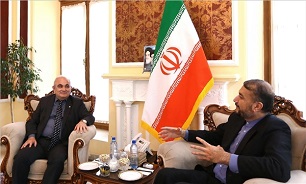Russia after Broader Tourism, Economic Cooperation with Iran
 Dzhagaryan, during his Sunday meeting with Amir Abdollahian, pointed to effective engagement between Iran and Russia in various fields, stressing the need for expansion of economic and tourism relations, especially in the private sector.
Dzhagaryan, during his Sunday meeting with Amir Abdollahian, pointed to effective engagement between Iran and Russia in various fields, stressing the need for expansion of economic and tourism relations, especially in the private sector.
The Russian diplomat also expressed his satisfaction with the constructive relationship between the two countries, calling for continuing and expanding bilateral cooperation at various levels.
During the meeting, the two sides conferred and exchanged views on regional and international developments and emphasized a political solution for Yemen and Venezuela crises.
Amir Abdollahian, for his part, said that stepped up parliamentary ties between Iran and Russia will play an effective role in expanding the overall ties.
In the meeting he expressed his happiness with the level of bilateral cooperation between Iran and Russian, saying “Tehran-Moscow parliamentary cooperation is effective for expanding bilateral ties.”
Early in February, Iranian Energy Minister Reza Ardakanian in a phone conversation with his Russian counterpart Alexander Novak conferred on the further development of ties and cooperation between the two countries, specially in the field of economy.
Ardakanian and Novak stressed continued Iran-Russia cooperation on the international level.
Further cooperation in the fields of energy, industry, transit and agriculture were discussed during the phone conversation between Iranian and Russian energy ministers.
In relevant remarks also in February, Dzhagaryan revealed that Moscow and Tehran had “essentially” turned away from the greenback in bilateral trade, and were using the ruble and rial for payments.
Turning to cross-currency trade was a “vital” issue for both Russia and Iran, and the two countries are planning to use “all available means” to boost these efforts, Dzhagaryan said in an interview with TASS.
“We have already essentially dropped the dollar in cooperation with the Iranians, we will rely on the Russian ruble and the Iranian rial, (and) in case of urgent need, on the euro, if we have no other options,” the diplomat said. He added that banking structures in both countries have the potential to cope with this “difficult” task.
Despite efforts by European countries to keep trading with the Islamic Republic after the US pulled out of the nuclear agreement, their efforts still do not fully address Tehran’s interests, Dzhagaryan believed.
Message end/
